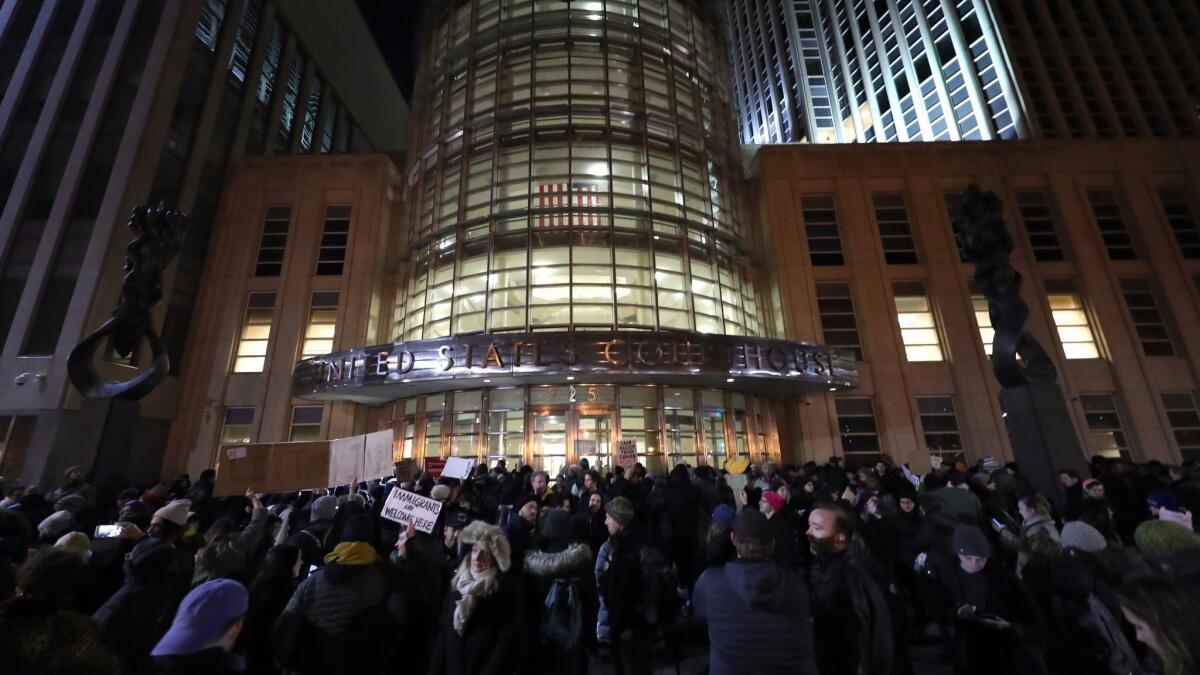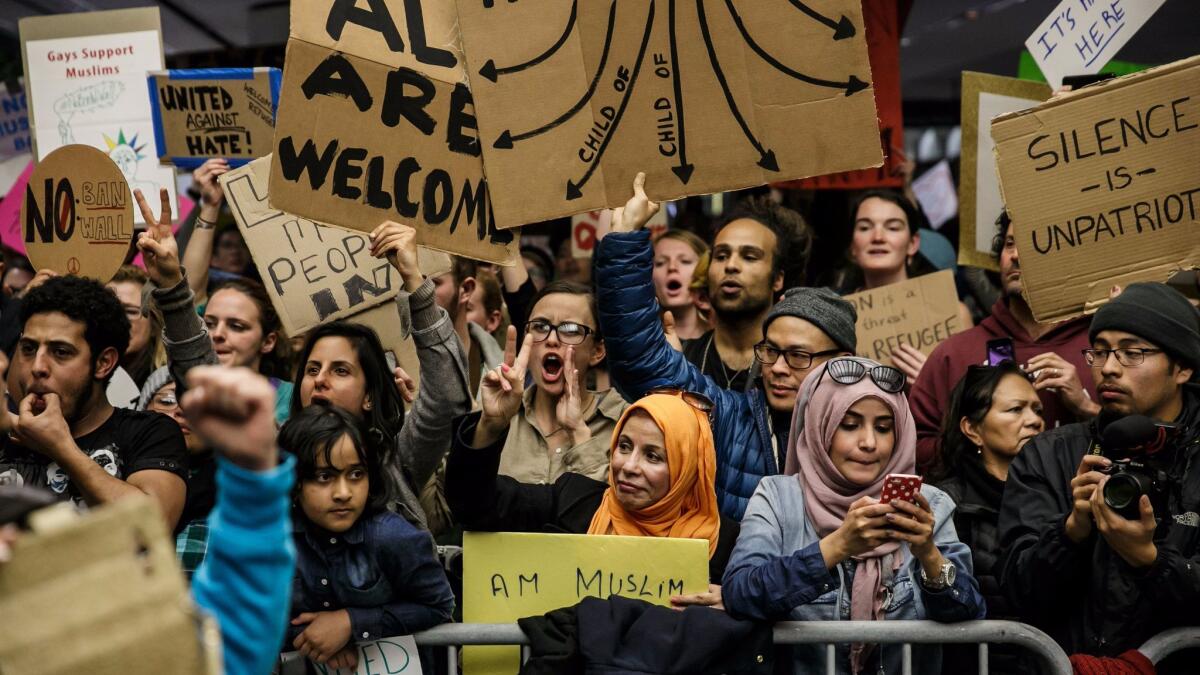Once again, the ACLU takes its place on the front lines of a liberal resistance

Reporting from New York — Lawyers aren’t usually this popular, but these weren’t your usual lawyers. Outside the federal courthouse in Brooklyn last weekend, a crowd of hundreds throbbed with jittery energy, chanting like soccer fans as they awaited the end of a court hearing inside, clearly favoring one side: “A-C-L-U, we are here, we stand with you!”
When the attorneys for the American Civil Liberties Union emerged, the crowd roared, hailing them as heroes. As the nonprofit has done so many times in its 97-year history, the ACLU had taken on the government and won.
“It was unbelievable,” ACLU attorney Lee Gelernt recalled, calling it the biggest crowd he’d seen in two decades of civil rights law. “It was just one of those classic civil rights moments.”
On a day when thousands of Americans had gathered to protest at airports around the country, the ACLU was among the legal organizations that sued the federal government over President Trump’s executive order banning travelers from seven Muslim-majority countries.

Stunned visa and green card holders were being detained on arrival, and Gelernt had just persuaded a judge to temporarily block the government from sending them back.
“What we’ve shown today is that the courts can work. They’re a bulwark in our democracy,” ACLU Executive Director Anthony Romero said, addressing the crowd.
Trump has moved with substantial speed to issue orders and make appointments that many liberals fear will infringe on the rights of immigrants, Muslims and other minorities. With Congress also under GOP control, many liberals are turning to outside organizations in an attempt to block the new administration’s progress.
Subscriptions to mainstream news publications and nonprofit investigative news outlets such as ProPublica and the Marshall Project have soared since the election; so have donations to left-leaning nonprofits like the Sierra Club and Planned Parenthood.
Few, if any, have rallied greater support than the ACLU, which, for the moment, has captured activists’ imagination in a way that the Democratic Party has not.
The ACLU’s membership has doubled to more than 1 million people in the months since Trump’s election, when the organization issued a defiant vow on its website and over social media: “We’ll see you in court.”
The ACLU is promising, as it often does, to take a place on the front lines of a liberal resistance, defending causes including voting rights, reproductive rights, LGBT rights, freedom of the press and the rights of Muslims and immigrants.
Conservatives have long been critical of the organization, with their ire often focused on the group’s contention that the 2nd Amendment’s guarantee of a “well-regulated militia” refers to a collective right, not an individual right, to gun ownership.
We make it harder for [the Trump administration] to go to the next thing on their to-do list.
— Anthony Romero, ACLU executive director
They have also opposed the group’s campaigns against religious expression within public institutions and restrictions on abortion and same-sex marriage.
After employees at Twitter recently announced they would donate $1.59 million to the ACLU, right-wing Breitbart News lost no time in describing the group as “an ideologically left-wing organization with strong ties to the Democratic Party.”
What has been remarkable about the events of the last two weeks has been the sudden groundswell of public support across a broad spectrum, backed by cash.
Twitter wasn’t the only tech enterprise to pony up support. Lyft, the ride-sharing company, pledged $1 million over four years, as its rival, Uber, was targeted with a consumer boycott for sending drivers to New York’s John F. Kennedy International Airport during a taxi-driver strike launched in protest of the Trump administration’s travel ban.
GV, the venture capital arm of Google’s parent company, Alphabet Inc., has devoted much of its home page to an invitation to donate to the ACLU.
Yet much smaller donors have been a key part of the fundraising effort. During last weekend’s protests, the organization gathered at least $31 million in donations, many of them from baristas, actors, musicians, tech figures and from owners of restaurants, bookstores, bakeries and coffee shops.
In Milwaukee, attorneys Amy Rogan-Mehta and Rebeca Lopez were barraged by messages from friends wondering how to get more politically involved. They decided to hold a fundraiser for the ACLU, citing its long history and its willingness to represent a wide range of causes. A local soccer bar, whose bartender is an immigrant, quickly volunteered its space.
After more than 100 people quickly RSVP’d to come, the pair had to find a second venue for an overflow crowd, and about 150 people ultimately attended.
“Folks are concerned about rights right now, and ACLU has done a good job of leveraging social media lately,” Rogan-Mehta said.
After last weekend’s protests, Liza Conrad, 28, a tech worker in New York, worked with a friend to create a website called Next Protest that lists all the upcoming protests in New York. The pair then went a step further and added link to donate to the ACLU.
“They have a proven track record,” Conrad explained. “They showed up ready to win, because this is what they’ve been doing for a long time, and they’re really good at it.”
The ACLU was founded in 1920 in the wake of the so-called Palmer Raids, when the federal government, fearing the rise of communism, began detaining and deporting alleged radical leftists.
“This, in some ways for us, is like business as usual,” said ACLU president and Brooklyn Law School professor Susan Herman, who likened the organization’s fight against Trump’s travel ban to its work against the Palmer Raids.
One of the ACLU’s first handbills from the 1920s laid out the organization’s strategy early: “Rights can be maintained only by insisting upon them — by organization, protest, demonstrations, test cases in the courts, and publicity.”
In the decades to come, the ACLU would launch affiliates in every state, plus the District of Columbia and Puerto Rico, and file thousands of civil rights lawsuits. It has played a role in some of the nation’s most famous court battles, including the 1925 Scopes trial over the teaching of evolution and the fight against the mass internment of Japanese Americans during World War II.
While officially nonpartisan, the ACLU has been criticized since its birth for heavily favoring liberal and leftist causes, though the group has also taken up highly unpopular 1st Amendment cases defending the rights of Nazis and the Ku Klux Klan.
But the group is clearly a life raft for the left at times when conservatives are in power; the group’s membership has typically surged under Republican presidents.
The ACLU led a drive for the impeachment of President Nixon during the Watergate controversy, proclaiming in a newspaper ad, “If he is allowed to continue, then destruction of the Bill of Rights could follow.”
The group’s membership also doubled to more than 500,000 under George W. Bush’s presidency as the administration expanded its national security powers after the Sept. 11, 2001, terrorist attacks.
Recent campaign finance data show that individual ACLU staff members overwhelmingly donate to Democratic candidates, though the organization as a whole does not endorse candidates or Supreme Court appointments.
“We don’t oppose presidents, we oppose presidents’ actions,” said Romero, the first Latino and openly gay man to serve as the group’s executive director, noting that the organization had researched and published a document on the campaign positions of both Trump and Hillary Clinton.
In those missives, the group voiced concern over Trump’s expressions of support for torture, mass deportations and a sweeping ban on Muslim immigration. “We knew if this man got elected, he would be a one-man constitutional crisis,” said Romero. (The group had also expressed concerns about Clinton’s previous support for mass surveillance and President Obama’s drone strike program.)
When Trump won on Nov. 8, Romero scheduled a conference call for the following Monday.
“It was just the most refreshing thing that happened all week, because he had a clear, calm, confident vision for how the ACLU was going to go about responding to Trump,” said Samuel Walker, a retired professor of criminal justice at the University of Nebraska at Omaha and a former ACLU board member.
Romero says his strategy is to block any legal overreaches by the new administration in court and to rally mass public support.
“If you can ball up the machinery of the Trump administration and rob them of momentum in the way we did last weekend, we make it harder for them to go to the next thing on their to-do list,” Romero said in an interview.
Court cases will also “frame the public debate and … galvanize the public response” so the public can “demand accountability from Congress, to make sure they serve a proper oversight role,” said Romero. “It’s the pincer action between legal advocacy and citizen action that is the powerful way to send a message that the government is on the wrong track.”
After the ACLU’s victory Saturday, a new message appeared on its website: a photo of Trump and a summons for more donations.
“He discriminated,” the message says. “We sued.”
Pearce reported from Los Angeles and Demick from New York.
ALSO
Seattle federal judge orders nationwide halt to immigration ban
A divided European Union has one thing in common: Mistrust of Trump
L.A. city attorney demands list of people detained at LAX under Trump’s travel order
More to Read
Sign up for Essential California
The most important California stories and recommendations in your inbox every morning.
You may occasionally receive promotional content from the Los Angeles Times.










